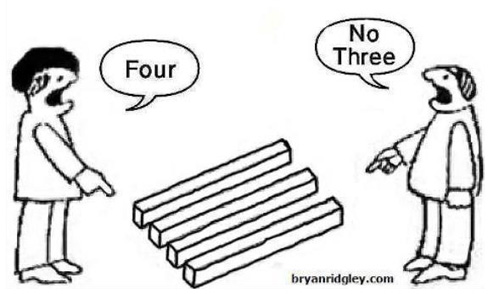I’ve started to think a lot about when conversations become an argument, and that led me to think a lot about how we argue.
When I first started writing about how we argue, I felt like objectivity was critical. Objectivity is “not influenced by personal feelings or opinions in considering and representing facts.” And when I read a definition like that, my first thought is that you’re only going to use facts. If someone asked me to argue my point, I would take an “objective approach” and provide the facts that would support my stance. I am not providing any opinions or bias; I’m providing cold, hard facts. Also, what the hell is a “cold, hard fact?” Both “cold” and “hard” can be subjective measures…
But the more I thought about it, the more I would likely only cite the “facts” that supported my argument, which is known as “confirmation bias.” I’m basically finding information that confirms what I already had either hypothesized or concluded. Confirmation bias comes into play when someone interprets ambiguous data as something that supports their argument, remembers selective information, or other instances where:
- an incorrect association is made between two data points (illusory correlation)
- a belief is based on information that was presented earlier in a sequence (primacy effect)
- a belief is maintained even though it’s been shown to be false (belief perseverance)
I think the problem with is that we often stop looking when we’ve found the support that we were looking for (or in some cases above, maintain my stance even though there may be other facts out there that were presented later). The internet is a huge resource, and one revelation I recently had was that other people have likely thought about the exact same thing that I have, and have probably written about it. The great thing about the internet is that people can find a number of articles that may support what they’re already thinking. The bad thing about the internet is that people can find a number of articles that can support what they’re already thinking.
So someone might be able to say, “these are objective facts. I’ve researched this stuff a lot and this is what I’ve found.” However, if I’m not looking for things to disprove what I’m thinking, then am I subjectively presenting what I “know” is fact? I’m likely just looking for how many days January has, not to see if January has ever had only 30 days in it. Because if I feel like my question was met on my initial search, I wouldn’t necessarily need to continue searching for things that don’t support what I was already thinking.
I recently rabbit-holed into the definition of reality, and learned that our own thoughts of reality are shaped based on what we’ve gone through. What you have to understand in any argument is that the person you’re arguing with likely believes you’re just as wrong as you think they are, and for all the same reasons. You both may (or may not) have facts that support your thoughts. Your belief is no stronger than theirs, or any more valid in their opinion. The feeling of deep passion and understanding that you have about your thought is just as strong as theirs. The amount of time you’ve spent researching, they may (or may not) have spent the exact same amount. You have just both started with a position, and then found evidence to back that position. Once you understand that, you may understand why people get so worked up about a disagreement.
That’s all for now. No puns in this guy, just cold, hard…opinions.
Thanks for reading.
– January 32
